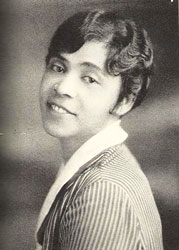1897-1953
THYRA EDWARDS - Black woman internationalist
By
Dolores Cox
Published Mar 23, 2012 9:08 PM
Women have had to struggle for their place in life. They have had to fight for inclusion, equality and rights, which were traditionally only accorded to men. Women have fought for liberation, freedom — and even for their lives.
One such woman was Thyra Edwards, born in 1897 in Wharton, Texas. Her grandparents were born enslaved Africans, who escaped from Missouri to Illinois with the help of the Underground Railroad. Edwards grew up in Houston during the Jim Crow era, which lasted throughout her life.
Edwards continually looked for places for Black women to be activists in the international community. She was a teacher, journalist, lecturer and social worker, who took an interest in child welfare, even founding her own children’s home. She was a strong advocate for women’s rights, a labor organizer, union publicist, peace and civil rights activist, and a Pan-Africanist.
Edwards taught school in Houston, worked as a social worker in Gary, Ind., and Chicago, and moved to New York to get employment as a journalist. She became interested in both child welfare legislation and labor relations. She combined her social work and interest in international affairs, gaining worldwide notoriety for her activism. Edwards also lived in Mexico, Italy, Spain, Denmark and the Soviet Union.
A. Philip Randolph, renowned labor head of the Brotherhood of Sleeping Car Porters and civil rights leader, was her special friend and mentor. He said that Edwards “is one of the most brilliant young women of the Negro or any other race, in public life today. She has not only a keen analytical mind, but a fine poise, modest charm and a fluency of presentation that will capture the admiration of the most critical.” (“Thyra J. Edwards, Black Activist in the Global Freedom Struggle,” University of Missouri Press, 2011)
Langston Hughes, Black playwright, novelist, poet and activist, was also Edwards’ friend from 1935 to 1941. Edwards edited The People’s Voice, a leftist newspaper created in 1942 by A. C. Powell Jr., and the Negro Digest, which frequently contained Hughes’ writings.
Against fascism, colonialism, U.S. racism
Speaking truth to power with her left-wing activism, Edwards was part of the larger struggle against fascism, colonialism and imperialism from the 1930s through the early 1950s. She attended the Women Against War and Fascism convention and in the 1930s Spanish Civil War supported Loyalist forces, who defended Madrid to try to keep it from falling into the hands of Gen. Francisco Franco’s fascist troops.
Edwards participated in fund-raising tours for the American Bureau to Aid Spanish Democracy. She also joined the African-American battalion in the Abraham Lincoln Brigade, volunteering to help the Spanish Republic. The Black brigadiers combined Pan-African nationalism with the class consciousness of the international labor movement.
In the 1930s and 1940s, Edwards wrote about international affairs for Black newspapers, presenting an anti-imperialist critique of world affairs to her readers.
In 1933, she joined the Chicago Scottsboro Action Committee to raise funds for legal appeals and new trials for the nine African-American youth in Alabama who had been falsely convicted of raping two white women on a freight train two years earlier. Through the International Labor Defense, the Communist Party took the lead in gathering support for the young men.
Edwards also worked with the CP’s Unemployed Council to actively protest apartment evictions. She was attracted by their militancy and ability to build alliances with other leftist groups to stop the evictions, and by their position on race and labor, emphasizing Black and white unity. In New York, Edwards worked closely with Benjamin Davis, a Harlem city councilperson and CP member.
Edwards’ involvement with the Loyalists in the Spanish Civil War and her activities with U.S. communists led to an FBI investigation. Government intelligence organizations harassed her until she died at the age of 56 in 1953.
Throughout her life, Thyra Edwards maintained an interest in the condition of oppressed working-class people worldwide.
Articles copyright 1995-2012 Workers World.
Verbatim copying and distribution of this entire article is permitted in any medium without royalty provided this notice is preserved.
Workers World, 55 W. 17 St., NY, NY 10011
Email:
[email protected]
Subscribe
[email protected]
Support independent news
DONATE


